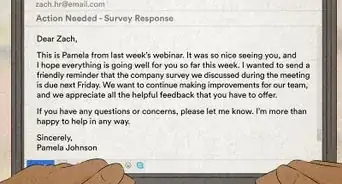This article was co-authored by Maya Diamond, MA. Maya Diamond is a Dating and Relationship Coach in Berkeley, CA. She has 13 years of experience helping singles stuck in frustrating dating patterns find internal security, heal their past, and create healthy, loving, and lasting partnerships. She received her Master's in Somatic Psychology from the California Institute of Integral Studies in 2009.
There are 9 references cited in this article, which can be found at the bottom of the page.
This article has been viewed 54,088 times.
Speaking passionately about some topics can cause offense to others inadvertently. It's great to have some strong opinions. It shows you care deeply, but it can sometimes blind you to the feelings and experiences of others. To reduce the chance of upsetting others in your zeal, consider who you are sharing your opinion with to communicate most effectively. Be aware of signs of tension, so you can respond appropriately and consider whether your opinions even need to be shared.
Steps
Knowing your Audience
-
1Keep the conversation light in a group of people you don't know. If you are trying to make a good impression, this may not be the time to bring up your firmly held beliefs.[1] Without the benefit of knowing the stances of those present, you run the risk of inadvertently offending someone with your strongly held opinions.
- Job interviews, joining a new social group, or being introduced to a friends or coworkers family are good examples of when it's best to keep strong opinions to yourself until you know the parties better.
-
2Share respectfully in groups of like-minded people you don't know well. By joining a group designed to bring like-minded people together, you won't have to worry so much about whether your opinion will offend others, but be mindful of the language you use. Your choice of tone and language may affect how your message is received. While all of the members may share similar core beliefs, there is probably great variation in how members choose to express their beliefs.
- You will usually only need to be extra careful in your word choice the first few meetings. After you become more comfortable with the members, you will likely fall into a natural feeling communication pattern.
Advertisement -
3Express your opinions to your friends freely, but remember you care about these people. Friends will tolerate your strong opinions better than others. They are also very likely to argue with those opinions. This is generally a healthy exchange, but remember to always be respectful.
- Neither of you will likely be greatly swayed by the argument, so you don't want to have damaged the relationship by using abusive language. Focus on using the word I, rather than you, to have an amicable disagreement.
-
4Choose your battles wisely. If you happen to find yourself in a group of people you know to hold strong opinions opposite of yours, you might decide to keep your opinion to yourself. You don't always have to have a say. You can choose to just be an observer.[2]
- If it is very important to you to share your opinion, even in these circumstances, consider forming a bond with a single member. You can then have a fair exchange between the two of you. If you do address the rest of the group at some later time, you'll know you have at least one supporter.
Recognizing when Tensions Arise
-
1Look for clenched jaws and teeth grinding. A common early sign someone is becoming tense is clenching the jaw tightly.[3] Most people don't realize when they are doing it, so it's a great way for you to gauge how well your opinion is being received. If you start to see jaws tighten, dial back your rhetoric or pause so the other person can address the source of the tension.
- If you start to notice you are the one becoming tense, relax your jaw. Remind yourself this is just a conversation, and there is no need to get worked up.
-
2Check the volume.[4] As people get worked up, their volume tends to get progressively louder. The raised voices are usually a response to frustration from feeling like they aren't being understood. In fact, many people describe the feeling of not being understood as not being heard or not being listened to. To reduce some of the tension, bring the conversation back down to an appropriate volume. To do this you just have to lower your speaking volume. The other will naturally start to match your tone.
-
3Measure the level of animation. Look for increased or exaggerated expressions. Pacing, leg shaking, fist clinching, large hand movements, and foot tapping can all be signs of agitation.[5] You'll know the person you are speaking to is not happy with your opinion as the behaviors increase or become more intense.You should take this as a sign to back off.
- This is a good time to do some listening. Letting to the other person talk and helping them feel understood will dissipate the tension.
-
4Monitor the tone of the conversation. Another sign the conversation is getting tense is the type of language used. If you notice the communication becoming progressively more aggressive or sarcastic, it might be time to take a break. It's difficult to dial back a conversation that has reached this stage, so consider changing the topic. You can then reintroduce the subject of disagreement, when cooler heads prevail.
- Avoid using sarcasm and aggressive language on your part.This will only make any perceived offense worse.
Being Open to Other Possibilities
-
1Listen more than you talk. It's tempting to monopolize the conversation when you feel passionately about a topic. Instead of giving into that urge, try just listening instead. In fact, you might notice when you feel strongly about a subject you don't listen to the other person at all; you are actually just formulating what you will say as soon as the other person pauses for a breath.[6] Commit to understanding the other's point of view.
- Try listening with the intent to be able to fully and fairly explain the other person's views. This may help you pay attention to what he or she means to convey.
-
2Ask challenging questions, respectfully. It is perfectly acceptable to ask challenging questions of someone who shares an opinion than your own, but understand the intent is to better understand their position, and not to win an argument. The goal of conversation should be to share ideas and experience; it shouldn't be about winning.
- Encourage others to ask you challenging questions as well. This will help clarify your belief for yourself, as well as others.
-
3Acknowledge that there may be more than one right answer. Your way may not be the wrong way, but it probably isn't the only way either. Be open to exploring other possibilities, or at least to the possibility you may both be wrong.[7]
- To really get in the spirit of this, you can try switching sides and expressing each other's opinion. This will give you a better understand of both parties' beliefs.
Avoiding Offending Others who have Strong Opinions
-
1Avoid controversial triggers. If you know someone to have a strong opinion about a particular subject, it may be best to avoid the topic. You can avoid a topic by simply not bringing it up, or politely excusing yourself if someone else broaches the subject. You might find a sudden urge to use the restroom or need to take a call outside.[8]
- If you've only just met a person but suspect he or she is highly opinionated consider avoiding religion and politics.[9] Both subjects are highly controversial, so it's a pretty good bet the person has strong opinions about one or both.
-
2Listen and demonstrate respect for the beliefs of others. If you find yourself in a conversation with someone who feels very strongly about the topic, treat his or her beliefs respectfully. It's okay to question the beliefs and opinions of others. Discussing controversial topics can actually make the involved parties more similar to each other, causing small changes in one another's thinking.[10] However, using strong language or sarcasm, can further polarize both parties. Ask questions about why the person feels the way he or she does and about alternatives to his or her opinion.
- Avoid making offensive or generally negative statements, like "it would be stupid to…" or "only an idiot would…" These kinds of statements are sure to incite someone with who obviously feels differently than you do.
-
3Transition to a less controversial topic.[11] Politely interrupt the conversations and divert attention to a new topic. You might start with a brief apology for interrupting and then make a statement or ask a question about an unrelated topic.
- Flattery is a great way to decrease the intensity of a person discussing a topic passionately. Try saying "I'm sorry to interrupt you, but I just noticed your shoes are fantastic. Where did you get them?"
Expert Q&A
-
QuestionHow do you deal with someone who is easily offended?
 Maya Diamond, MAMaya Diamond is a Dating and Relationship Coach in Berkeley, CA. She has 13 years of experience helping singles stuck in frustrating dating patterns find internal security, heal their past, and create healthy, loving, and lasting partnerships. She received her Master's in Somatic Psychology from the California Institute of Integral Studies in 2009.
Maya Diamond, MAMaya Diamond is a Dating and Relationship Coach in Berkeley, CA. She has 13 years of experience helping singles stuck in frustrating dating patterns find internal security, heal their past, and create healthy, loving, and lasting partnerships. She received her Master's in Somatic Psychology from the California Institute of Integral Studies in 2009.
Relationship Coach If you notice you are the one who is escalating the volume, an effective way to immediately deescalate is to comment, "Wow, I am talking really loudly; I need to bring it down a notch." This will reset the conversation to a reasonable tone and acknowledge things were getting a little heated.
If you notice you are the one who is escalating the volume, an effective way to immediately deescalate is to comment, "Wow, I am talking really loudly; I need to bring it down a notch." This will reset the conversation to a reasonable tone and acknowledge things were getting a little heated. -
QuestionIs it wrong to be offended?
 Maya Diamond, MAMaya Diamond is a Dating and Relationship Coach in Berkeley, CA. She has 13 years of experience helping singles stuck in frustrating dating patterns find internal security, heal their past, and create healthy, loving, and lasting partnerships. She received her Master's in Somatic Psychology from the California Institute of Integral Studies in 2009.
Maya Diamond, MAMaya Diamond is a Dating and Relationship Coach in Berkeley, CA. She has 13 years of experience helping singles stuck in frustrating dating patterns find internal security, heal their past, and create healthy, loving, and lasting partnerships. She received her Master's in Somatic Psychology from the California Institute of Integral Studies in 2009.
Relationship Coach Not at all! Being offended by offensive things is a completely natural response. You just want to make sure that you keep your cool when you get aggravated by something offensive. Take a few seconds to focus on your breathing, or walk away and just take a break until you're calm. This way, you won't lash out and you'll be able to handle the problem in a calm, adult manner.
Not at all! Being offended by offensive things is a completely natural response. You just want to make sure that you keep your cool when you get aggravated by something offensive. Take a few seconds to focus on your breathing, or walk away and just take a break until you're calm. This way, you won't lash out and you'll be able to handle the problem in a calm, adult manner. -
QuestionWhat if I want to say my opinion, but my opinion is bad?
 Community AnswerWho says your opinion is bad? I think it is difficult to label opinions as ‘good’ or ‘bad’ because they are often subjective and based on our own personal values and beliefs. So it likely is not, ‘bad’ but just different. Be willing to offer your opinion and willing to listen to the opinions of others. Try to avoid becoming defensive or letting the conversation turn into an argument and you’ll be fine.
Community AnswerWho says your opinion is bad? I think it is difficult to label opinions as ‘good’ or ‘bad’ because they are often subjective and based on our own personal values and beliefs. So it likely is not, ‘bad’ but just different. Be willing to offer your opinion and willing to listen to the opinions of others. Try to avoid becoming defensive or letting the conversation turn into an argument and you’ll be fine.
Warnings
- Don't share your opinion for the sake of it.⧼thumbs_response⧽
- Avoid using alcohol, as it may reduce inhibition and result in regret.⧼thumbs_response⧽
References
- ↑ http://mnliteracy.org/sites/default/files/curriculum/master_conversation_-_small_talk.pdf
- ↑ https://www.ivyexec.com/executive-insights/2012/listening-and-silence-are-powerful-communications-skills/
- ↑ http://www.gracepointwellness.org/116-anger-management/article/5812-recognizing-anger-signs
- ↑ http://www.speaking.pitt.edu/student/public-speaking/suggestions-verbal.html
- ↑ https://www.helpingstrugglingteens.com/2010/03/identifying-signs-of-anger/
- ↑ https://www.ivyexec.com/executive-insights/2012/listening-and-silence-are-powerful-communications-skills/
- ↑ http://populationgrowth.org/how-to-communicate-peacefully-on-tough-issues/
- ↑ Maya Diamond, MA. Master's in Somatic Psychology & Relationship Coach. Expert Interview. 17 January 2019.
- ↑ http://mnliteracy.org/sites/default/files/curriculum/master_conversation_-_small_talk.pdf










































































